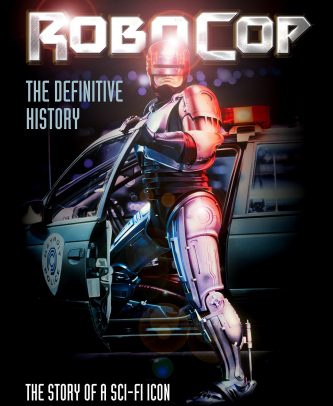 By CALUM WADDELL (Titan Books; 2014)
By CALUM WADDELL (Titan Books; 2014)
That title is somewhat misleading, as this is not the “definitive” history of ROBOCOP (1987) and its offshoots. A handsomely designed large format hardcover, this book makes for a good coffee table accessory, but its contents, as drafted by author Calum Waddell, are unsatisfying.
The prominent MGM logo on the copyright page gives a good idea of the book’s orientation: it’s a promotional tool that exists primarily to sell DVDs of the MGM owned ROBOCOP flicks, and tickets to the 2014 remake. This explains all the attention lavished on the latter, which apparently came along swimmingly under the direction of Jose Padilha and an “incredibly talented, devoted, and happy cast and crew” who, as related in a quintessential bit of studio-approved puffery, all had a great time making it.
As a massive fan of the original ROBOCOP I particularly enjoyed the section of the book devoted to its rocky filming. The film was a low budgeter made by Paul Verhoeven, a Dutch director unfamiliar with American moviemaking, and was a miserable experience for everyone involved. The finished product was of course a huge hit with critics and audiences, and went on to become a pop culture touchstone that endures to this day.
As for the chapters on ROBOCOP 2 and 3, I wasn’t too enthused, as both films are pretty worthless (having ended the directorial careers of their respective helmers Irvin Kershner and Fred Dekker). The most interesting ROBOCOP offshoots in my view are the Frank Miller scripted comic book sequels (including the highly esteemed ROBOCOP VERSUS THE TERMINATOR), but Waddell gives them only passing mentions, with his—and MGM’s—primary interest being the films.
In his chapter on the ROBOCOP remake Waddell evinces what might be interpreted as either a wildly contradictory stance or a subtle sense of subversion. His touting of Jose Padilha’s toned-down aesthetic in the remake (which “does not need brains splattered across windows. It would be out of tone”) is directly opposed to the attitude expressed in his chapter on the PG-13 rated ROBOCOP 3, whose director Fred Dekker is quoted as saying “I didn’t push the envelope like I should have.”
Another quote about the filming of the remake, on which “Everyone was all smiles, every day,” likewise flies in the face of the book’s previous content, particularly the chapter on the original ROBOCOP, whose shoot, according to producer Jon Davison, was “a nightmare” on which “A terrible time was had by all”—yet the film nonetheless went on to become a classic, something the new ROBOCOP, with its alleged conflict-free shoot, didn’t. Then we have Waddell’s ultimate summation, which takes the form of a quote by screenwriter Ed Neumeier: “This is truly Jose Padilha’s ROBOCOP. It is his film,” thus indicating precisely where the blame for its failure should be placed.
